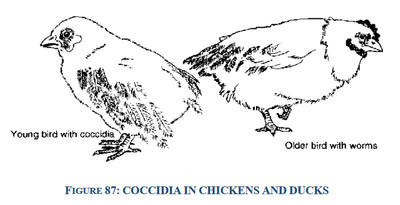Internal Parasites of Chickens and Ducks
Internal Parasites of Chickens and Ducks
Introduction
The gut of chickens and ducks can be infected with a number of different roundworms. Heavy infections cause weight loss, diarrhea and poor egg production. The thin, red gizzard worm lives in the wall of the gizzard of ducks and is the cause of loss of appetite, weight loss, diarrhea and death of birds.Both chickens and ducks can be infected with very small parasites called coccidia which live in the wall of the gut. These cause diarrhea, weight loss and can result in the deaths of very many young birds.
Parasitic worms of Chickens and Ducks
Chickens and ducks become infected with worms from soil, feed or water contaminated with worm eggs.Worm eggs survive in warm, damp conditions. A large white roundworm (10 cm long) is found in the intestine. Small, fine hairworms live in the gut walls. Other worms, about 1 cm long, can be found in the lower region of the gut.
Worm infections are of greatest importance in young birds and cause poor appetite, loss of weight and diarrhea. Heavy infections can cause death. In older birds loss of weight and poor egg production occurs.
The gizzard worm causes loss of appetite, weight loss, and diarrhea and may result in the death of ducks, especially young birds.
Coccidia in Chickens and Ducks
Coccidia cannot be seen without a microscope. Many different coccidia infect different parts of the gut in both chickens and ducks. Birds are normally infected with a number of different coccidia.
Birds are infected by contaminated soil, feed or water and will suffer few problems if the infection is low. Young birds, especially under a month old, can be badly affected. Diarrhea occurs and the droppings may be bloody. Coccidia can kill young birds within 2 weeks of the disease appearing.

Coccidia are the cause of a dangerous disease of young chicks.
Treating parasitic infection of birds
Worms can be killed by treating the bird with a suitable anthelmintic. Ail worms are killed by tetramisole or levamisole. Birds are either treated separately or the drugs are mixed with the feed or water. Coccidia are treated with several drugs which are added to the drinking water or feed.
Preventing parasitic infections in chickens and ducks
- Infection with all internal parasites in both chickens and ducks can be controlled by keeping birds in clean conditions and stopping them wandering around free.
- Cages and houses should be kept clean with droppings removed every week.
- Feed and water containers should be cleaned out every day.
- Do not allow wet muddy areas to develop around water containers or anywhere else.
- Cages and houses should be thoroughly cleaned before new birds are placed in them.
- Do not keep birds on the same area of ground year after year as contamination of the soil will increase.
- Young birds should be kept separate from older birds.
- Do not place young birds, especially under 3 months old, in runs where older birds have recently been kept as they may develop infection with coccidia.
- If possible regularly treat young birds for coccidia (ask your veterinarian for advice).
When you buy new birds ask your veterinarian or agricultural officers who is selling good birds which will not bring disease into your community's birds.
Source : Pashu Sakhi Handbook
Last Modified : 5/15/2023
This topic provides information about the brooding...
This topic provides information about 20th Livesto...
This topic provides information about feeding chic...
This topic provides information about the incubato...
